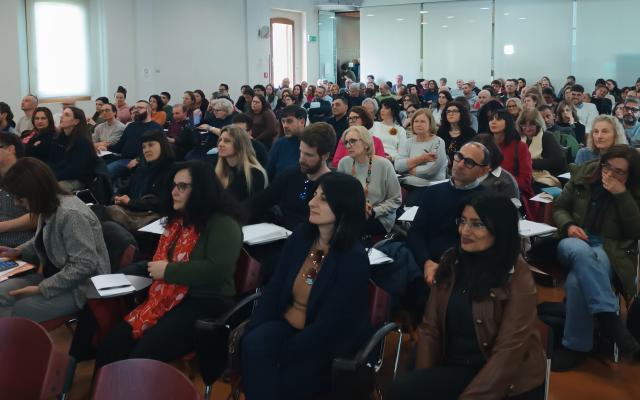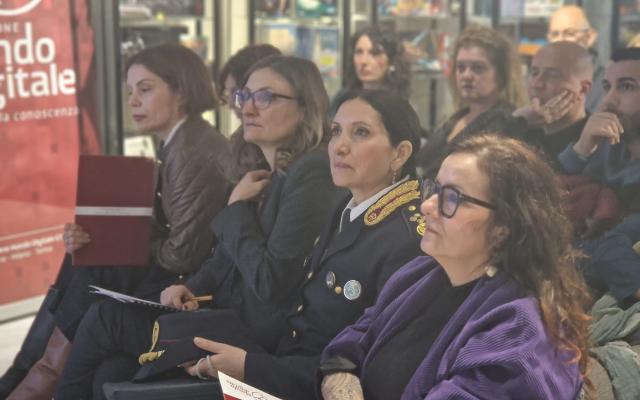Cybersecurity Seminars programme presented at the Campidoglio
Cybercrime is spreading rapidly and cyber attacks in Italy are on the rise. In 2024 alone, the Computer Security Incident Response Team (Csirt), set up by the National Cybersecurity Agency, handled 1,979 cyber events, 165 per month, affecting 2,734 victims, twice as many as the previous year, mainly in the most vulnerable sectors of the economic and administrative system. At the top of the list of threats is ransomware, a daily emergency for small and medium-sized enterprises, which often lack adequate defences.
Against this backdrop, the international programme Cybersecurity Seminars by Google.org in collaboration with Virtual Routes, promoted in Italy by the University of Milan and the Fondazione Mondo Digitale ETS, is taking shape. The aim is to build a widespread culture of digital security and transform students from all faculties into new professional resources for the country's cyber resilience. The project was presented yesterday, 16 June, at the Sala del Carroccio in the Campidoglio, during the event “Protect the present, shape the future”, sponsored by the National Cybersecurity Agency, which was attended by representatives from the academic, institutional and business worlds, moderated by Emma Evangelista, editor-in-chief of the magazine Microfinanza.
Cybersecurity Seminars offers an experiential and interdisciplinary programme that includes:
- practical seminars
- themed hackathons
- internships at local organisations
- service learning activities for social impact.
The programme involves 140 undergraduates and recent graduates, 175 local organisations, including public administrations, third sector organisations and SMEs. Particular attention is paid to inclusion: the project's EDI Champion is Silvia Salini, full professor of Statistics at the University of Milan, who guarantees equal opportunities and participation even for students with unconventional backgrounds. During the event, the companies Advens and Teleconsys spoke about how Italian businesses are tackling new digital challenges, starting with the vulnerability of SMEs and the role of security in the value chain.
WHAT THEY SAID
Cybercrime is now structured and transnational, difficult to combat and highly profitable. To tackle it, shared resilience is needed from all advanced countries, as it is a pervasive threat affecting all essential services, from healthcare to transport. As the National Cybersecurity Agency, we intervene on several fronts, for example to restore the functionality of affected public services, such as the healthcare system. Our commitment also includes promoting the training of professionals specialised in cybersecurity, in a context where there is often a lack of full awareness of the risks and dynamics of the digital world. Today, a country that is both digitised and secure gains a competitive advantage and greater stability. This is why every educational programme, regardless of discipline – from political science to philosophy to law – should include adequate training in cybersecurity.
Nunzia Ciardi, Deputy Director General of the National Cybersecurity Agency
Cybersecurity has become a pillar of European regulation, as demonstrated by the various regulations issued on the subject. There is therefore a need, recognised by the University of Milan, to train professionals who are able to manage these regulatory aspects and who can act as a link between the more technical professionals, who have always dealt with the subject, and the managerial professionals, who have suddenly found themselves involved in the creation of a corporate policy that is attentive to cybersecurity issues. The project designed by the University of Milan and Fondazione Mondo Digitale, through a multidisciplinary training course that alternates more theoretical content with practical experience, will seek to meet the new needs of the market and support organisations - especially SMEs in the Italian business fabric - in responding to these new challenges.
Pierluigi Perri, Associate Professor in IT Security, Privacy and Sensitive Data Protection, University of Milan
With this project, we aim to address the shortage of 880,000 cybersecurity professionals in Europe. In particular, with the support of Google.org, we are supporting the education system and national organisations in training students who will then aim to contribute to the protection of their local communities.
Martina Colasante, Government Affairs & Public Policy Manager, Google Italy
Cybersecurity is no longer just a technical issue, but a real digital right. To build a more resilient and inclusive society, we must start with education and actively involve local communities, especially the most vulnerable ones. With Cybersecurity Seminars, we want to transform students from all faculties into agents of change by offering them concrete, interdisciplinary and socially impactful training experiences. This is how cybersecurity becomes a democratic skill, a right to knowledge. The project is fully in line with our mission: to activate collaborative educational ecosystems, build bridges between universities, schools, businesses and communities, and generate social innovation through knowledge.
Mirta Michilli, Director General of the Fondazione Mondo Digitale
The programme has been a great success in terms of enrolments, with over 40 different degree courses at more than 40 universities throughout Italy, 30 per cent of which are women. Fifty per cent of those who responded completed their studies less than 10 years ago. We also have many workers: 20 per cent graduated almost 20 years ago. The challenge for us now is to calibrate and personalise the hours of independent study through surveys adapted to different profiles. Everyone who participates in Cybersecurity Seminars must be able to have a transformative experience!
Silvia Salini, full professor of statistics at the University of Milan
Cybersecurity is now a strategic function for protecting the economy, society and our digital daily lives. It is not just about defending against attacks, but about building trust, enabling innovation and ensuring the continuity of essential services. At Advens, we deeply believe in the role of the younger generation in building a more secure and inclusive digital future. That is why we invest in training, mentorship and partnerships with schools and universities, to make the world of cybersecurity accessible to everyone, beyond stereotypes and traditional paths. To young people, I want to say: don't be afraid of cybersecurity. It is a world full of opportunities where many different skills are needed, not just technical ones.
Cristina Mariano, Country Manager Advens Italy
The Cybersecurity Seminars project represents a strategic investment in human capital and national security. SMEs, which account for 99% of the Italian business fabric, often lack the resources to develop adequate internal skills, but are crucial to the national economy. One of the objectives is to help strengthen national cyber resilience by increasing the overall security of the country and raising the cybersecurity posture of SMEs, which are frequently targeted by cyber attacks, not least because they are vulnerable links in the supply chain of strategic organisations subject to the NIS2 Directive. SME security is national security.
Marco Massenzi, CEO Teleconsys




